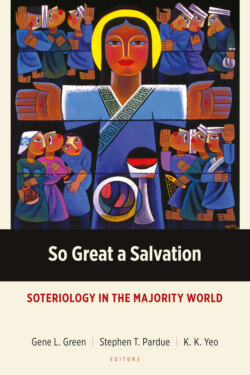Читать книгу So Great a Salvation - Группа авторов - Страница 9
На сайте Литреса книга снята с продажи.
Conclusion
ОглавлениеThe doctrine of salvation in the Majority World is not a theological construct or abstract idea, but a matter of life or death. Christians in the Majority World find the Philippian jailer’s question, “What must I do to be saved?” (Acts 16:30), a significant and timely reflection in the twentieth-first century. However, in most developed countries, especially in Europe and North America, faith in science and material prosperity, as well as a preference in cosmopolitan culture for therapies, often condition people to reduce or even brush aside their problems of plight, sin, and “lostness”[15] and, subsequently, their need of salvation.
Many who live in the Latino/a contexts of conflict, oppression, and violence are desperate to find liberation, peace, and hope.[16] African Christians address their world, which is plagued with HIV/AIDS, poverty, and war, by looking for a soteriology of emancipation from such ills and evils.[17] Asian multi-religious, scriptural, linguistic, and racial social realities inevitably cry out for a soteriology that addresses natural disasters, epidemics, child labor, human trafficking, and dissymmetry of wealth. Christians of indigenous groups in the United States, Borneo, and Australia wrestle with a soteriology that will save their land and bring them an identity of nationhood, political freedom, and self-determination. Understanding soteriology in one’s context is nothing new. In Salvation in the New Testament, Jan G. van der Watt is adamant that “the documents of the New Testament [cannot] be classed as abstract theological treatises. They should rather be seen as reflecting [in the ancient world] the integration of the message into particular situations of the people involved in the first and original communication process.”[18]
The hope of the series editors is that you will read this volume in conjunction with other volumes in the same series. For soteriology is the mega-theme of Scripture, “the integrating center of Scripture [and] the coordinating center of theology.”[19] The salvation motif is prevalent in the Bible and Christian theology because of the “many dimensions” of soteriology by which “most key theological issues . . . converge.”[20] Soteriology is symbiotically related to the nature and work of God the Savior (theology; the author of salvation), the person and deeds of Christ (Christology; the agent of salvation), the work of the Spirit (pneumatology; the agency of salvation), the need and being of humanity (anthropology; together with the creation, the recipient of salvation), the identity and function of the church (ecclesiology; the channel of salvation to the world), the process and goal of history (eschatology; salvation consummated).
I believe that soteriology is about God’s pneumatology of universality (God’s working out his plan of salvation in the whole creation) that has a Christological inclusivity (of all who are saved). Therefore, the church lives out that eschatological hope proleptically (Søren Kierkegaard’s “life can only be understood backwards; but it must be lived forwards”)[21] and prophetically (mercy and justice) to the ends of the earth. Majority World scholars in this volume come to us from among the nations, and they offer us the courage and the grace to care for the world redemptively without borders.
* * *
The series editors wish to give thanks to many of our friends who partner with us in this project, witnessing to the global church in action regarding soteriology in the global context of Scripture and theology. We are grateful to the authors in this volume for providing numerous drafts of their presentations at the 2015 Atlanta conference of ETS (Evangelical Theological Society) and IBR. We are indebted to ScholarLeaders International (especially Evan Hunter), the Rivendell Steward’s Trust, and the SEED Research Institute (John Shen, Moses Cui) for their generous financial and prayer support. The leadership of ETS, IBR, and the Society of Biblical Literature (SBL) has provided hotel space and efficient logistical support for our conferences. Michael Thomson of Eerdmans continues to believe in our work and guide us to navigate smoothly through publishing waters. Chris Wright, Pieter Kwant, and Mark Hunt of Langham Partnership International encourage us and partner with us in publishing our work, but also in caring for the future scholars of the Majority World.
I praise God for the global church living out the mission of God sacramentally (salvation in and through the body of Christ), every time we meet, “breaking bread” at academic conferences or online/iCloud. Oh, “so great a salvation!” (Heb. 2:3). I echo Paul’s words as a prayer: “For we are the aroma of Christ to God among those who are being saved and among those who are perishing; to the one a fragrance from death to death, to the other a fragrance from life to life” (2 Cor. 2:15–16).
